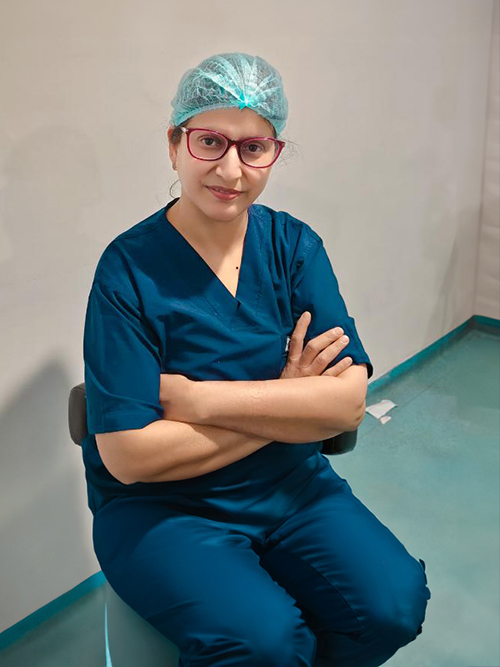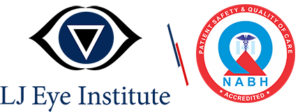Age Related Macular Degeneration
One of the biggest Retina Clinic in Haryana. Experience the Trust: Where Cutting-Edge Technology Meets 16+ Years of Retina Expertise.
In Numbers
Demographics
Technology / Innovation
LJEI is equipped with all the latest and rare Machines / Technology including AI.
Research
We preserve every single case study to handle any complex situation and publish research papers time to time.

AMD
What is Age Related Macular Degeneration (AMD)?
There are two main types of AMD:

Why To Choose LJ Eye Institute For Age Related Macular Degeneration Treatment?
The institute employs state-of-the-art imaging technologies like optical coherence tomography (OCT) and fluorescein angiography (FA) to precisely diagnose and monitor AMD progression. These technologies allow for early detection of pathological changes, facilitating timely intervention.
LJ Eye Institute utilizes PDT, a targeted laser treatment combined with a light-sensitive medication, to selectively destroy abnormal blood vessels in the eye while minimizing damage to surrounding healthy tissue.
LJ Eye Institute specializes in minimally invasive surgical procedures for advanced AMD cases, such as vitrectomy. These procedures aim to remove scar tissue, repair retinal damage, and improve visual outcomes.
What Happens in the Eye in AMD?
Occurring much less frequently, wet AMD happens when abnormal blood vessels start to grow beneath the retina, leaking fluid and blood into the surrounding area. Since this fluid backup can cause distortion, wet AMD is much more dangerous.
Wet macular degeneration always begins with dry AMD. But dry AMD does not always lead to wet AMD. (Dry AMD does not mean dry eyes; the name just indicates that wet AMD is not present.)
Symptoms to Watch Out For AMD?
One of the main differences is that symptoms of dry AMD come on gradually, if they’re noticed at all, while symptoms of wet AMD appear suddenly — although they may be preceded by symptoms of dry AMD.
Signs and symptoms of dry AMD, include the following:
- Smudges or dark spots appear in your vision, especially in the morning
- Colors appear faded
- Bright lights are irritating
- You have difficulty adjusting your vision when you go from dark to light environments
- Straight lines appear to bend
- When you read, words tend to disappear
Signs and symptoms of wet AMD
- Straight lines appear to bend.
- You have blurry central vision or a blind spot anywhere in your field of vision.
- You have difficulty adjusting your vision when you go from dark to light environments.
- You have difficulty seeing fine detail without a very bright light.
- You experience trouble with face recognition.
How Is AMD Diagnosed?
Both types are diagnosed by using tests that can reveal changes in the macula and retina. Such tests include:
- Visual field test: You will be asked to look at a grid of straight lines with a dot in the middle, called an Amsler grid, to see if any lines look wavy or broken, and if the center dot is obscured.
- Eye exam with dilation: Your doctor will put drops in your eyes that widen your pupils, then observe your retina using a special lens.
- Fluorescein angiography: After injecting a yellow dye called fluorescein into a vein in your arm, your doctor can observe the dye as it travels through blood vessels in the eye, revealing any macula leakage.
- Optical coherence tomography (OCT): This diagnostic tool takes photos of the back of the eye, including the retina and macula. No dye or other medication is necessary.
- Optical coherence tomography angiography: Using the OCT device, this imaging method uses laser light reflection in place of fluorescein to produce 3D images of blood flow through the eye.
How long does age-related macular degeneration last?
What age range is most affected by macular degeneration?
What does age-related macular degeneration lead to?
Can macular degeneration be cured?
Can you live a normal life with macular degeneration?
Is sunlight bad for macular degeneration?
AMD Specialist Dr. Ruchi Mittal
Performed 3000+ Cornea Transplant Surgeries
My Approach
Lorem ipsum dolor sit amet, consectetur adipiscing elit. Phasellus vehicula ac nisl ut euismod. Vestibulum id magna rutrum, efficitur neque non, congue ante. Fusce ac finibus sem. Sed nec purus sagittis, euismod neque ac, ultrices lacus. Aenean iaculis lacinia magna, id elementum dolor malesuada sit amet. Sed at mollis velit. Suspendisse cursus, velit eu
Lorem ipsum dolor sit amet, consectetur adipiscing elit. Phasellus vehicula ac nisl ut euismod. Vestibulum id magna rutrum, efficitur neque non, congue ante. Fusce ac finibus sem. Sed nec purus sagittis, euismod neque ac

What is Macula? Macula and its problems explained
आंख के पर्दे के ऑपरेशन के बाद किन बातों का ध्यान रखना चाहिए?
Symptoms of Age Related Macular Degeneration
Blurry or fuzzy vision
Difficulty recognizing familiar faces
Straight lines appear wavy
A dark, empty area
blind spot appears in the center of vision
Loss of central vision
AMD In Numbers
Diabetic Retinopathy
Green LASER Operations
Anti VGEF Injections
OCT Tests
Our Retina Specialist, Dr. Ruchi Mittal is an alumna of the esteemed Sankara Nethralaya
Most Advanced Zeiss Clarus Angiography
LJ Eye Institute is the only Eye Hospital equipped with most advanced Zeiss Clarus High Resolution Fluorescein Angiography technique for Diabetic Retinopathy Patient. The examination of the eye’s retina will no longer require the insertion of medicine and waiting for an hour for the pupil to dilate, thanks to modern technology.


Technology @ LJEI
Technology Available For Diabetic Retinopathy Treatment at LJEI
LJ Eye Institute employs ultra-advanced technologies for Diabetic Retinopathy Procedures.
- ZEISS Optical Coherence Tomography (OCT) Systems
- ZEISS Clarus 700 | Fundus Photography
- Argon LASER
- Green LASER
- Intraocular Injections
- Low-energy laser pulses
- YAG laser

Still Have Questions?

Cornea Patients Feedbacks

I have operated of my sister(chetna) eye Injection by Dr Ruchi Mittal under STAR insurance from LJEye Institute,Ambala. Dr Ruchi Mittal is a best Retina doctor. Insurance team is a best team of LJ. Staff is best. Thankyou.

cracker injury and retina problem taking treatment from dr. ruchi mittal. she makes us so comfortable and provide us best treatment. my son feeling better. cooperative staff and clean environment.

I’m taking treatment for retina problem from dr. Ruchi Mittal. She is the best doctor for retina. I’m happy. Everything is good in this hospital staff and all.

Its a great experience here and such a nice staff here as my mother have retinal surgery done by Mrs. Ruchi Mittal

I had visited lj eye institute ambala for retina checkup and it’s really fruitful. Thank u Dr. Ruchi mittal.

My retina treatment is going good here.dr. ruchi Mittal is best doctor for retina in haryana.
Empanelments



















